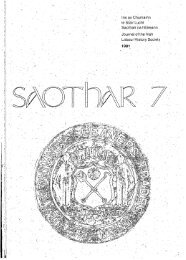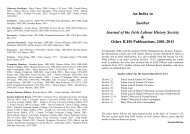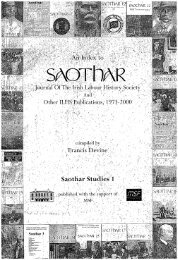48 SAOTHAR 13of the poor such as orphans and the insane. Orphan children, being unable to protect themselvesphysically or legally, were often the victims of the horrific maladministration of foundling institutionsin eighteenth century Ireland. The transfer of these children into the early poor law system deprivedthem of the specialised care they might have received had the existing institutions been allowed tocontinue along improved lines. This is also true of the relief and treatment of the insane both beforeand after the introduction of the poor law. The eventual development of the workhouse into a centrefor social services reflected the long -delayed realisation of the links between sickness, illegitimacy andpoverty. Assistance rather than punishment gradually became the guiding principle.The undoubted quality of Robins's earlier work on charity children is reflected in his latest bookon the history of the mentally-ill. The book is mildy traditional in its approach in that it begins in preChristian times and concludes in the 1960s. Despite this the loss of depth in the most relevant areas hasbeen minimal. In general it is easier than its more specialised predecessor by Finnane whichconcentrated heavily on the history oflegislation. 5 Unlike Robins's earlier book, however, his historyof Irish insanity cannot be termed a definitive work but is rather a readable and highly competentintroduction on which others will hopefully build. One of his most important contributions lies in thebook's historiographical approach. Histories of Irish poor relief experience have been very few andvirtually all of them concentrate on institutions rather than on social processes. The useful if noddingreference to social context in Strain's history of the Belfast Charitable Society is departed from evenby Burke and Finnane who plunge straight into their history oflocal relief institutions. 6 To some extentthe historians have cleaved to the most accessible evidence, whether in the form of minute books orparliamentary reports. The sources used tend to be official rather than private and so the emergentportrait unavoidably mirrors the rather restricted field of nineteenth century official vision. The internalworkings of the various institutions have been explored and less attention has been given to the no-lessimportant impact of the relief system upon the local communities. This next and necessary step in thehistoriography ofIrish poor relief is anticipated to some extent by Robins whose treatment of the historyof the insane deals, however tentatively, with processes and so resembles true social history.NotesGerard O'Brien1. R.D.C. Black, Economic Thought and the Irish Question, 1817-1870, (Cambridge, 1960), is about the onlyexception.2. For examples of such rejection see G. O'Brien, 'The New Poor Law in Pre-Famine Ireland: a case history',in Irish Economic and Social History, xii, 1985,33-49.3. Black, op.cit., p. 102.4. Ibid., pp. 107-9.5. M. Finnane, Insanity and the1nsane in Post-Famine Ireland , (London, 1981); J. Robins, The Lost Children:A Study o/Charity Children in Ireland, 1700-1900 , (Dublin, 1980).6. R.M.W. Strain, Belfast and its Charitable Society, (Oxford,1961).
ESSAYS IN REVIEW 49ConnolIy:Myth and RealityAusten Morgan, James Connolly - A Political Biography, (Manchester University Press, Manchester,1988), pp.234. £17Morgan's book opens with the warning that it 'contests Greaves' view that ConnoUy was a wouldbeLenin, by examining his revolutionary politics through the focus of Desmond Ryan'sobservationthat he was 'a man who belonged to and worked within two worlds: the world of international socialismand the world of militant nationalism'.' (p. x) The thesis offered by Morgan is, in all its essentials, thatJames Connolly, after spending most of his life as an active socialist changed, or made a transition tonationalism. In the preface, Morgan says of Connolly:'The transition in his politics from 1914 was a product of historical crisis. Connolly's revolutionaryresponse in wartime was mediated by socialist collapse ... and by nationalist commitment ... He was aninternational socialist activist who witnessed for the Irish Revolution, thereby giving working class politicsa strong nationalist identity.' (p. x)The thesis argued by Morgan is put in a less' transitional' form later in the book where he states in thefirst line of chapter seven, 'National Revolutionary, 1914-1916','In August 1914 Connolly became a revolutionary nationalist, but he was not fmally accepted until early1916, when he joined the armed conspiracy planning an Easter Insurrection.' (p. 139)Morgan, in defending this thesis, anticipates that it will receive greater acceptance from exponentsof 'liberal revisionism or anti-national Marxism' (p. ix). Quite what Morgan's own position is is notexplicit. Although it is fairly clear that he is not in any definable Marxist tradition, it is probably fairto say that he is closer to liberal revisionism.In addition to the essential thesis on Connolly's dramatic conversion to nationalism in August of1914, Morgan argues that the Rising of 1916 was wrongly characterised by Lenin. In Morgan' s opinionthe Easter Rebellion was not simply 'premature' in the context of international conditions, butcompletely lacking in mass sympathy or support at the time. Hence, in Morgan' s view, the Rising wascorrectly described by Karl Radek as a putsch. Subsequent events too - the 1918 anti-conscriptioncampaign, the eventual War ofIndependence and the growth of mass support for the IRA and Sinn Feinat the end of the war - were, in Morgan' s judgment, not in any important respect due to the events ofthe 1916 Rising.These bold assertions are not especially new. Connolly did have his critics at the time of the Rising-and there is certainly room for a critical appraisal ofConnolly' s political theory and practice. Althoughsome of the biographical evidence which he marshals does shed some new light on the political flawsin Connolly's understanding and application of Marxism, it remains difficult to be convinced byMorgan's main contentions. Part of the problem with Morgan' s book is that, although he has done amountain of work in arriving at exactitude on the biographical details ofConnolly's life, there is littleexposition of the evolution and continuities in Connolly' s thought. Granted, Morgan does refer to theinfluences that formed the context for Connolly's political education; but if the central thesis inMorgan's book is to be upheld, it is necessary to come to grips more roundly with how Connollyunderstood the relation between the national struggle for independence and the Marxist programme forsocialism. In order to do this properly, it is necessary to distinguish the other influences that Connollyabsorbed and the manner in which he adapted his Marxism to them. Otherwise it becomes difficult torelate his eventual participation in the Rising to his previous thought, and even less possible to assessthe merits of ConnoIly's political thought in its own right.Desmond Greaves, for example, argues that Connolly' s thought and practice only reached maturity
- Page 1 and 2: JOURNAL OF THE IRISH LABOUR HISTORY
- Page 3 and 4: ContentsPageEditorial: Labour Histo
- Page 5 and 6: EDITORIAL 3freedom to participate i
- Page 7 and 8: CorrespondenceThe Irish Labour Part
- Page 9 and 10: ; ~ ; ,The Decline and Fall of Donn
- Page 11 and 12: THE DECLINE AND FALL OF DONNYBROOK
- Page 13 and 14: THE DECLINE AND FALL OF DONNYBROOK
- Page 15 and 16: ·' THE DECLINE AND FALL OF DONNYBR
- Page 17 and 18: THE DECLINE AND FALL OF DONNYBROOK
- Page 19 and 20: THE DECLINE AND FALL OF DONNYBROOK
- Page 21 and 22: THE DECLINE AND FALL OF DONNYBROOK
- Page 23 and 24: THE DECLINE AND FALL OF DONNYBROOK
- Page 25 and 26: ,'-,;-''''.A PASSAGE TO BRITAIN 23C
- Page 27 and 28: A PASSAGE TO BRITAIN 25only in the
- Page 29 and 30: A PASSAGE TO BRITAIN 27clothing._De
- Page 31 and 32: A PASSAGE TO BRITAIN 29established
- Page 33 and 34: ;:-.",.- .. .", ...... '.:. '
- Page 35 and 36: LOUIE BENNETI 33feminist movement w
- Page 37 and 38: :... ~: ."
- Page 39 and 40: -.- '.LOUlE BENNETT 37While there i
- Page 41 and 42: LOUIE ~ENNEIT 39Xl's encyclical Qua
- Page 43 and 44: LOUIE BENNEIT 41Bennett's own relat
- Page 45 and 46: LODIE BENNETT 43109; IWWU resolutio
- Page 47 and 48: Essays in ReviewCosherers, Wanderer
- Page 49: ••• .".'. >. '~"ESSA YS IN RE
- Page 53 and 54: ESSAYS IN ~EVIEW 51tion' in the Int
- Page 55 and 56: ESSAYS IN REVIEW53International:'I
- Page 57 and 58: REVIEWScontroversy is real history.
- Page 59 and 60: REVIEWSJoe Monks was among the earl
- Page 61 and 62: REVIEWSnolly-Column Song','Proudly
- Page 63 and 64: REVIEWSresulting from the arrival o
- Page 65 and 66: REVIEWS,63the book by means of an a
- Page 67 and 68: REVIEWSlogue, it is hardly surprisi
- Page 69 and 70: The Team For All Workers ...CULIAIB
- Page 71 and 72: ESSAYS 69mission and moral refonn.l
- Page 73 and 74: .. ...... ~.~ -~ .'- '.ESSAYS. 71fr
- Page 75 and 76: ESSAYS 73claimed authority but whic
- Page 77 and 78: ESSAYS 75provided the basis for soc
- Page 79 and 80: ESSAYS 779. For comparisons see E.T
- Page 81 and 82: ESSAYS 7952. Annals of Christ Churc
- Page 83 and 84: ESSAYS' 81Fianna Fail and the Worki
- Page 85 and 86: ESSAYS 83Eireann in 1925 visibly di
- Page 87 and 88: ESSAYS 85recognition of the impract
- Page 89 and 90: ESSAYS 871970, it created the condi
- Page 91 and 92: ESSAYS89The Irish Immigrants' Contr
- Page 93 and 94: ESSAYS" 91Although anti -Catholic p
- Page 95 and 96: ESSAYS 93McCowie played a key role
- Page 97 and 98: :. -,,'.' ',. .~.,:.ESSAYS 95Althou
- Page 99 and 100: ESSAYS 97young girl of their own ba
- Page 101 and 102:
SourcesIrish Labour History Society
- Page 103 and 104:
SOURCES 101INovember, 1971 to no. 1
- Page 105 and 106:
SOURCES 103would claim credit for t
- Page 107 and 108:
SOURCES105Sources for Irish Labour
- Page 109 and 110:
SOURCES 107NorthWest Archives and L
- Page 111 and 112:
SOURCES 109In 1966 the Finnish gove
- Page 113 and 114:
TURNINGANEWLEAFThe CPSSUis the larg
- Page 115 and 116:
REMINISCENCE 113us due to my politi
- Page 117 and 118:
REMINISCENCE 115when Jim was presen
- Page 119 and 120:
REMINISCENCE 117of Dail Eireann. 17
- Page 121 and 122:
REMINISCENCE 119NotesThe above arti
- Page 123 and 124:
DOCUMENT STUDY 121James Connolly in
- Page 125 and 126:
DOCUMENT STUDY123SOCIAL DEMOCRATIC
- Page 127 and 128:
DOCUMENT STUDY 125proletariat of th
- Page 129 and 130:
DOCUMENT STUDY 127the support of Je
- Page 131 and 132:
DOCUMENT STUDY 12926. The Workers'
- Page 133 and 134:
131BibliographyA Bibliography of Ir
- Page 135 and 136:
BIBLIOGRAPHY 133Compton, P.A. Demog
- Page 137 and 138:
BIBLIOGRAPHY 135Levine, I. and Madd
- Page 139 and 140:
BIBLIOGRAPHY 137Turner, M. 'Towards
- Page 141 and 142:
BIBLIOGRAPHY 1394. Land and Agricul
- Page 143 and 144:
BIBLIOGRAPHY 141Clogher Record12 (2
- Page 145 and 146:
BIBLIOGRAPHY 143Political Research
- Page 147 and 148:
BIBLIOGRAPHY 145Pres, 1987.O'Brien,
- Page 149 and 150:
147Notes on Contributorsf onathanBe
- Page 151 and 152:
1901: Ireland's first general union
- Page 153 and 154:
ELECTRICAL TRADES UNION .Establishe





